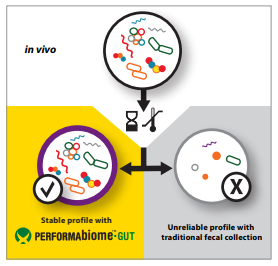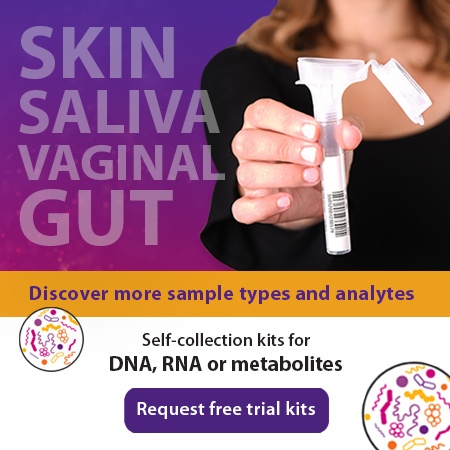2019-08-13
“The importance of gut microbiome on host health has been known for decades, but traditional methods made it difficult to study the bacteria and their relationship with the host in much detail.” – Dr. Kelly Swanson
Human gut microbiome research has grown rapidly in recent years with many new discoveries linking the gut microbiome to a variety of diseases, diet, and mental health. Within the gut microbiome research area, there has been an emergence of interest in animal microbiome – specifically canine gut microbiome.
Research in the human microbiome field was able to expand due to the techniques and tools that are available for stool collection and analysis. We spoke with Dr. Kelly Swanson from The University of Illinois who saw the positive reports given for human stool microbiome collection tools (OMNIgene·GUT) and wanted to test a similar device with canines (PERFORMAbiome·GUT).
“The microbiome field is buzzing and powerful techniques are now available, but proper protocols [for canine microbiome] are necessary so that the data generated are accurate. Maintaining sample integrity can be a challenge when samples are collected in the field or at home and/or when they are shipped to the laboratory for analysis.” – Dr. Swanson
Putting canine gut microbiome collection to the test.
 In Dr. Swanson’s study they collected stool samples from 30 healthy adult dogs using PERFORMAbiome·GUT to test whether the fecal collection kit could stabilize and prevent negative changes when stored at room temperature, high temperature, or under freeze-thaw cycles compared to controlled fresh samples stored at -80ºC. For the initial study, they analysed the fecal samples using 16S rRNA-based Illumina sequencing to test the overall shifts in bacterial diversity, evenness, and taxonomy.
In Dr. Swanson’s study they collected stool samples from 30 healthy adult dogs using PERFORMAbiome·GUT to test whether the fecal collection kit could stabilize and prevent negative changes when stored at room temperature, high temperature, or under freeze-thaw cycles compared to controlled fresh samples stored at -80ºC. For the initial study, they analysed the fecal samples using 16S rRNA-based Illumina sequencing to test the overall shifts in bacterial diversity, evenness, and taxonomy.
“I think sample collection methods are of utmost importance. Although a few publications have suggested that fecal samples are stable and collection method is not too important, we don’t believe that to be true. Our data from this study confirms that rapid collection and stabilization and/or proper storage are necessary to accurately represent the samples collected.”- Dr. Swanson
After receiving their results, they learned that PERFORMAbiome can be used to reliably collect samples off-site while maintaining sample integrity when stored at room temperature, high temperature, and under freeze-thaw cycles compared to controlled samples stored at -80ºC.
What’s next for the world of animal microbiome?
“Great advances have been made in the past decade, but we still have a limited understanding in the area. As for opportunities, I think a better characterization and greater understanding of the gut microbiome, how gut microbes respond to environmental factors, and how specific microbial taxa affect the host, will take us one step closer to personalized medicine and personalized nutrition.”- Dr. Swanson
In Dr. Swanson’s next research phase, he hopes to focus his studies on dietary interventions on indices of gastrointestinal health and gut microbiome in cats and dogs by studying the effects of dietary fibres, prebiotics, yeast fermentation products, etc.
What challenges do we expect from canine microbiome studies?
Challenges can occur within all research fields, including canine gut microbiome. According to Dr. Kelly Swanson the challenges for canine microbiome research are:
- There is a need for more physiologically relevant outcomes to be measured non-invasively so that we can better understand the effect that the microbiota have on the host.
- As the ability to generate large and complicated datasets continues to increase, data handling and interpretation is a challenge.
- When it comes to taxonomy, the field needs to go beyond the genus level. Studying microbes at the species and strain level is required.
- The field needs to move beyond taxonomy, with more focus on metabolic function and activity.
We are excited to read more about Dr. Swanson’s research on canine microbiome once published.
PERFORMAbiome·GUT is an all-in-one system for easy collection with total homogenization and stabilization of animal fecal samples at point-of-collection. If you are interested in testing PERFORMAbiome·GUT for your animal microbiome project, you can request free samples below.


